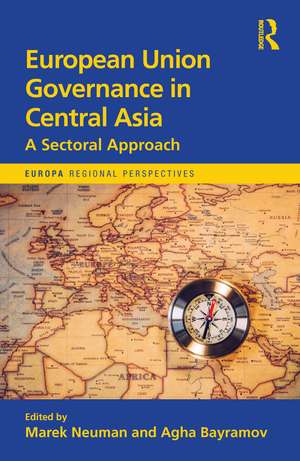European Union Governance in Central Asia: A Sectoral Approach: Europa Regional Perspectives
Editat de Agha Bayramov, Marek Neumanen Limba Engleză Hardback – 9 dec 2024
Din seria Europa Regional Perspectives
- 8%
 Preț: 390.14 lei
Preț: 390.14 lei -
 Preț: 341.97 lei
Preț: 341.97 lei -
 Preț: 371.23 lei
Preț: 371.23 lei - 18%
 Preț: 1160.47 lei
Preț: 1160.47 lei -
 Preț: 389.38 lei
Preț: 389.38 lei -
 Preț: 449.41 lei
Preț: 449.41 lei - 17%
 Preț: 253.67 lei
Preț: 253.67 lei -
 Preț: 382.68 lei
Preț: 382.68 lei -
 Preț: 389.88 lei
Preț: 389.88 lei -
 Preț: 460.69 lei
Preț: 460.69 lei -
 Preț: 409.87 lei
Preț: 409.87 lei -
 Preț: 389.66 lei
Preț: 389.66 lei - 29%
 Preț: 254.60 lei
Preț: 254.60 lei - 29%
 Preț: 252.79 lei
Preț: 252.79 lei - 28%
 Preț: 207.60 lei
Preț: 207.60 lei - 29%
 Preț: 241.15 lei
Preț: 241.15 lei - 15%
 Preț: 209.80 lei
Preț: 209.80 lei - 34%
 Preț: 260.25 lei
Preț: 260.25 lei - 37%
 Preț: 124.95 lei
Preț: 124.95 lei - 30%
 Preț: 258.32 lei
Preț: 258.32 lei -
 Preț: 449.41 lei
Preț: 449.41 lei -
 Preț: 389.66 lei
Preț: 389.66 lei
Preț: 937.21 lei
Preț vechi: 1029.90 lei
-9% Nou
Puncte Express: 1406
Preț estimativ în valută:
179.33€ • 187.74$ • 148.39£
179.33€ • 187.74$ • 148.39£
Carte tipărită la comandă
Livrare economică 05-19 aprilie
Preluare comenzi: 021 569.72.76
Specificații
ISBN-13: 9781032670195
ISBN-10: 1032670193
Pagini: 286
Ilustrații: 12
Dimensiuni: 156 x 234 mm
Greutate: 0.69 kg
Ediția:1
Editura: Taylor & Francis
Colecția Routledge
Seria Europa Regional Perspectives
Locul publicării:Oxford, United Kingdom
ISBN-10: 1032670193
Pagini: 286
Ilustrații: 12
Dimensiuni: 156 x 234 mm
Greutate: 0.69 kg
Ediția:1
Editura: Taylor & Francis
Colecția Routledge
Seria Europa Regional Perspectives
Locul publicării:Oxford, United Kingdom
Public țintă
Academic and GeneralNotă biografică
Marek Neuman is Assistant Professor in EU Foreign Policy and Jean Monnet Chair of European Policy and Governance at the University of Groningen, the Netherlands. His research interests are the EU’s foreign policy vis-à-vis Eastern Europe and Central Asia, and the role Central and Eastern European countries play in shaping this.
Agha Bayramov is Assistant Professor at the Department of International Relations and International Organization of the University of Groningen. His research interests are energy security, the Caspian Sea region, Karabakh, Eurasia, infrastructure, and climate change. He is a co-founder of The Hague Research Institute for Eastern Europe, the South Caucasus and Central Asia.
Agha Bayramov is Assistant Professor at the Department of International Relations and International Organization of the University of Groningen. His research interests are energy security, the Caspian Sea region, Karabakh, Eurasia, infrastructure, and climate change. He is a co-founder of The Hague Research Institute for Eastern Europe, the South Caucasus and Central Asia.
Cuprins
Introduction Part I: The European Union in Central Asia: Theories, Concepts and Strategies 1. The European Union as Partner in Region-Building in Central Asia 2. Designing, Mapping, and Reshaping Borders in Central Asia 3. Various Understandings of Rule of Law: Conceptualization of Actor Centric Perspective 4. EU Foreign Policy and How Contested Spaces Become Regions Part II: The European Union in Central Asia: Security and Conflict Resolution 5. The European Union’s Central Asia Policy in the time of the Russo-Ukrainian War. The Role of Poland 6. Fearing Borders, Bordering Fears: The EU and Border Management in Central Asia 7. The Use of Soft Power in Digital Public Diplomacy: the Cases of Germany, Spain and Italy in the countries of Central Asia 8. Central Asia and the Trans-Regional Project "Western China - Western Europe" in Focus of the EU Strategy for Central Asia 9. The European Union Addressing Environmental Disputes in Central Asia: Evaluating the Effectiveness of a ‘Reluctant 3rd Party’ Part III: The European Union in Central Asia: Sector-specific Issues and Policies 10. Quality of Governance in Kyrgyzstan and the role of EU Development Aid in Promoting Good Governance 11. The EU as a Good Governance Promoter in Central Asia: Some Lessons Learned from E-Justice Implementation in Kyrgyzstan 12. Europe-Central Asia Relations: Dispelling the Formal Myths Through Informal Media Products 13. What is the Footprint of Foreign Donors, Universities and Other Organisations in the Modernisation of Higher Education of Uzbekistan 14. EU-Central Asia: A New Energy Strategy in a Reshaped Geopolitical Landscape 15. EU's Green Power in Central Asia: The Case of the Aral Sea and the Environmental Political Culture in Kazakhstan and Uzbekistan Conclusion Bibliography
Descriere
This edited volume attempts to critically approach EU-Central Asian relations, asking whether – when adopting a more sectoral governance approach – the EU’s transformative power vis-à-vis the region is greater than initially argued and if so, under what conditions it flourishes most.
